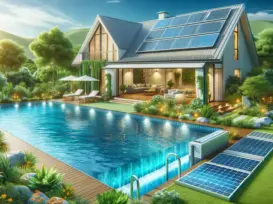Grus Home Energy - water conservation
Maximizing Every Drop: Smart Strategies for Sustainable Water Conservation
Maximizing Every Drop: Smart Strategies for Sustainable Water Conservation
Water, the sustainer of life, is an invaluable resource that we often take for granted. With the increasing demand on water supplies due to population growth, climate change, and environmental degradation, it’s imperative that we shift towards sustainable water conservation strategies. Not only do these strategies preserve our ecosystems, but they also ensure that future generations will have access to clean water.
Conserving water starts with individual action. Simple changes in daily routines can lead to significant savings. For instance, turning off the tap while brushing your teeth can save up to 200 gallons of water per month. Likewise, fixing a dripping faucet can prevent the waste of as much as 3,000 gallons of water annually. When watering plants, doing so early in the morning or late in the evening minimizes evaporation, and using a broom instead of a hose to clean driveways and sidewalks can save hundreds of gallons of water.
At the community level, water conservation can be bolstered through educational programs that raise awareness about the importance of saving water. Local governments and organizations can promote the installation of water-efficient appliances and fixtures, such as low-flow toilets and showerheads, which not only conserve water but also reduce utility bills. Rainwater harvesting systems can be implemented to collect and reuse rainwater for landscaping and other non-potable uses.
On the agricultural front, water conservation is vital. Agriculture accounts for a substantial portion of freshwater usage globally, but through smarter irrigation practices, such as drip irrigation and soil moisture sensors, water use can be optimized. Farmers can also adopt conservation tillage and crop rotation to improve soil moisture retention, thereby reducing the need for irrigation.
Industry also has a significant role to play in water conservation. Many industrial processes require large amounts of water, but by recycling and reusing water within plants, companies can dramatically cut down on consumption. Moreover, investing in water-saving technologies and processes not only conserves water but often leads to more efficient production, resulting in economic benefits.
The management of water resources at the regional and national levels is equally crucial. Authorities should enforce strict regulations to prevent the pollution of water bodies and invest in the maintenance of water infrastructure to reduce losses from leaks and breaks. Integrated water resource management, which considers the holistic management of water resources, should be a priority for governments to ensure the equitable and sustainable use of water.
Lastly, innovation in technology and policies will drive the future of water conservation. Advancements in desalination and wastewater treatment technologies expand the sources of usable water. Incentive programs for water-saving measures can encourage both consumers and industries to invest in water-efficient solutions.
In conclusion, water conservation is an essential practice that requires a concerted effort from individuals, communities, industries, and governments. By integrating water-saving habits into our lifestyles, investing in efficient technologies, and implementing sound water management policies, we can protect this precious resource. Sustainable water conservation is not just about reducing consumption; it’s about changing our relationship with water to ensure its availability for all life on Earth, now and in the future.
©2025 All Rights Reserved. Grus IoT Co.,Ltd.

